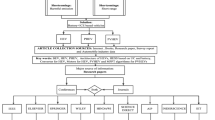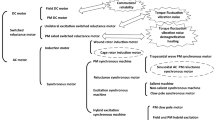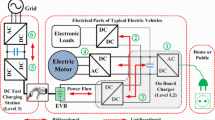Abstract
This work presents a 22 kW class high-efficiency inductive power transfer (IPT) system for wirelessly charging electric vehicles with 800 V class batteries. Ansys Maxwell simulation is conducted by analyzing the international standard IEC61980-3 to design and implement a 22 kW class transceiver. The battery load is modeled from the charging profile of a 22 kW and 800 V battery to select the optimal IPT topology. Six types of impedance compensation circuits are theoretically analyzed based on the above-mentioned experimental setup, and the optimal design of resonance parameters is designed. The ultimately selected IPT topology based on the optimal design results for each topology is an LCC–CCL structure with constant current output characteristics. A 22 kW class LCC–CCL structure IPT system capable of wirelessly charging an 800 V class battery is designed and manufactured, and experiments are conducted to verify its performance in all alignments of the transceiver and the entire battery charging profile. Based on the results of the theoretical analyses and experiments, the proposed IPT system confirms that the zero-voltage switching operation is possible at a fixed switching frequency of 83 kHz. In the 22 kW load condition, the maximum efficiency of 95.7% is achieved in the center alignment condition, and the IPT system achieves a high efficiency of 94% or more even in the maximum misalignment condition.













Similar content being viewed by others
Data availablity
The data that support the finding of this study are available from the corresponding author upon reasonable request.
References
KOTRA, Eco-friendly vehicle support policies by major European countries. (2020). https://news.kotra.or.kr/user/globalBbs/kotranews/782/globalBbsDataView.do?setIdx=243&dataIdx=180273 Accessed 03 Mar 2020
e-HIKE, What’s the current state of wireless EV charging? (2018). https://e-hike.net/tr/content/whats-current-state-wireless-ev-charging
Bojarski, M., Asa, E., Colak, K., Czarkowski, D.: A 25 kW industrial prototype wireless electric vehicle charger. Proc. APEC 16, 1756–1761 (2016)
Kusaka, K., Kusui, R., Itoh, J., Sato, D., Obayashi, S., Ishida, M.: A 22 kW-85 kHz three-phase wireless power transfer system with 12 coils. Proc. ECCE 19, 3340–3347 (2019)
Obayashi, S., et al.: 85 kHz band 44 kW wireless rapid charging system for field test and public road operation of electric bus. World Electr. Veh. J. 10(2), 26 (2019)
Onar, O.C., Su, G., Asa, E., Pries, J., Galigekere, V., Seiber, L., White, C., Wiles, R., Wilkins, J.: 20-kW bi-directional wireless power transfer system with energy storage system connectivity. Proc. APEC 20, 3208–3214 (2020)
Byun, J., Kim, M., Joo, D., Lee, W., Choe, G., Lee, B.: Frequency and phase-shift control of inductive power transfer for EV charger with LCCL-S resonant network considering misalignment. J. Elect. Eng. Technol. 14(6), 2409–2419 (2019)
Aditya, K., Willliamson, S.S.: Design guidelines to avoid bifurcation in a series–series compensated inductive power transfer system. IEEE Trans. Ind. Electron. 66(5), 3973–3982 (2018)
Aditya, K.: Design and implementation of an inductive power transfer system for wireless charging of future electric transportation. Ph’D Thesis (2016)
Imura, T.: Wireless power transfer using magnetic and electric resonance coupling techniques. Springer, Berlin (2020)
Moon, S., Kim, B., Cho, S., Ahn, C., Moon, G.: Analysis and design of a wireless power transfer system with an intermediate coil for high efficiency. IEEE Trans. Ind. Electron. 61(11), 5861–5870 (2014)
Li, S., Li, W., Deng, J., Nguyen, T.D., Mi, C.C.: A double-sided LCC compensation network and its tuning method for wireless power transfer. IEEE Trans. Veh. Tech. 64(6), 2261–2273 (2015)
Wang, C., Stielau, O.H., Covic, G.A.: Load models and their application in the design of loosely coupled inductive power transfer systems. Proc. PowerCon 00, 1053–1058 (2000)
Wang, C., Covic, G.A., Stielau, O.H.: Power transfer capability and bifurcation phenomena of loosely coupled inductive power transfer systems. IEEE Trans. Ind. Electron. 51(1), 148–157 (2004)
Lee, G.: A technology trend and analysis of electric vehicle wireless charging system. KIPE Mag. 26(1), 30–35 (2021)
Nagendra, G.R., Boys, J.T., Covic, G.A., Riar, B.S., Sondhi, A.: Design of a double coupled IPT EV highway. Proc. IECON 13, 4606–4611 (2013)
Aditya, K., Williamson, S. S.: Design considerations for loosely coupled inductive power transfer (IPT) system for electric vehicle battery charging-A comprehensive review. In: Proceedings of IEEE Transportation Electrification Conference and Expo 1–6 (2014)
Yang, S., Sun, P., Wu, X., Shao, W., Sun. J.,: Parameter design and verification of inductive contactless power transfer system based on double-sided LCCL resonance. In: Proceedings of 13th IEEE Conference on Industrial Electronics and Applications 2393–2398 (2018)
Li, B., Lu, J., Li, W., Zhu, G.: Realization of CC and CV mode in IPT system based on the switching of double-sided LCC and LCC-S compensation network. Proceedings of International Conference on Industrial Informatics-Computing Technology, Intelligent Technology, Industrial Information Integration 364–367 (2016)
Hu, H., Cai, T., Duan, S., Zhang, X., Niu, J., Feng, H.: An optimal variable frequency phase shift control strategy for ZVS operation within wide power range in IPT systems. IEEE Trans. Power Electron. 35(5), 5517–5530 (2019)
Wang, C., Covic, G.A., Stielau, O.H.: General stability criterions for zero phase angle controlled loosely coupled inductive power transfer systems. Proc. IECON 01, 1049–1054 (2001)
Steigerwald, R.L.: A comparison of half-bridge resonant converter topologies. IEEE Trans. Power Electron. 3(2), 174–182 (1988)
Lee, I., Moon, G.: The k-Q analysis for an LLC series resonant converter. IEEE Trans. Power Electron. 29(1), 13–16 (2013)
Cuo, Y., Wang, L., Zhang, W., Li, S., Liao, C.: Rectifier load analysis for electric vehicle wireless charging system. IEEE Trans. Ind. Electron. 65(9), 6970–6982 (2018)
Cuo, Y., Zhang, Y., Zhang, W., Wang, L.: Battery parameter identification based on wireless power transfer system with rectifier load. IEEE Trans. Ind. Electron. 68(8), 6893–6904 (2020)
Colak, K., Asa, E., Bojarski, M., Czarkowski, D., Onar, O.C.: A novel phase-shift control of semibridgeless active rectifier for wireless power transfer. IEEE Trans. Power Electron. 30(11), 6288–6297 (2015)
IET TS 61980–3:2019: Electric vehicle wireless power transfer (WPT) systems-part 3: specific requirements for the magnetic field wireless power transfer systems. (2019)
Acknowledgements
This work was supported by the National Research Foundation of Korea grant funded by the Government of Korea (MSIT) (2021R1F1A1059249).
Author information
Authors and Affiliations
Corresponding author
Ethics declarations
Conflict of interest
The authors declare that they have no conflict of interest.
Rights and permissions
Springer Nature or its licensor (e.g. a society or other partner) holds exclusive rights to this article under a publishing agreement with the author(s) or other rightsholder(s); author self-archiving of the accepted manuscript version of this article is solely governed by the terms of such publishing agreement and applicable law.
About this article
Cite this article
Park, JU., Oh, JM., Bok, YH. et al. 22 kW high-efficiency IPT system for wireless charging of electric vehicles. J. Power Electron. 23, 374–386 (2023). https://doi.org/10.1007/s43236-022-00569-w
Received:
Revised:
Accepted:
Published:
Issue Date:
DOI: https://doi.org/10.1007/s43236-022-00569-w




